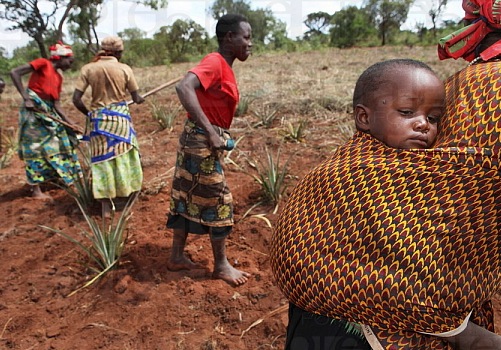
More and more evidence points to how empowering women is key to economic stability, food security, and human well-being. The role of women in agriculture, especially in developing nations, and their vulnerability to ecosystem degradation is often overlooked. According to the Millennium Ecosystem Assessment (2005):
Significant differences between the roles and rights of men and women in many societies lead to women’s increased vulnerability to changes in ecosystem services. Rural women in developing countries are the main producers of staple crops like rice, wheat, and maize. Because the gendered division of labor within many societies places responsibility for routine care of the household with women, even when women also play important roles in agriculture, the degradation of ecosystem services such as water quality or quantity, fuelwood, agricultural or rangeland productivity often results in increased labor demands on women. This can affect the larger household by diverting time from food preparation, child care, education of children, and other beneficial activities.Yet gender bias persists in agricultural policies in many countries, and rural women involved in agriculture tend to be the last to benefit from—or in some cases are negatively affected by—development policies and new technologies.
And more from a noteworthy Op-Ed in the New York Times by Olivier De Schutter (3 Mar 2013) discussing the “Feminization [meaning a disproportionate number of farmers are women] of Farming”:
Across the developing world, millions of people are migrating from farms to cities in search of work. The migrants are mostly men. As a result, women are increasingly on the front lines of the fight to sustain family farms. But pervasive discrimination, gender stereotypes and women’s low social standing have frustrated these women’s rise out of poverty and hunger.
Discrimination denies small-scale female farmers the same access men have to fertilizer, seeds, credit, membership in cooperatives and unions, and technical assistance. That deters potential productivity gains. But the biggest barriers don’t even have to do with farming — and yet they have a huge impact on food security.
As sole or principal caregivers, women and girls often face a heavy burden of unremunerated household chores like cooking, cleaning, fetching water, collecting firewood and caring for the very young and the elderly. These uncompensated activities are equivalent to as much as 63 percent of gross domestic product in India and Tanzania. But they result in lost opportunities for women, who don’t have the time to attend classes, travel to markets to sell produce or do other activities to improve their economic prospects.
To be sure, some female-headed farm households get remittances from absent men, but that is often not enough to compensate for the economic pressures they face. And we know that when women get more education and improve their social and economic standing, household spending on nutrition increases, child health outcomes improve and small farms become more productive…[read the rest of the article here].